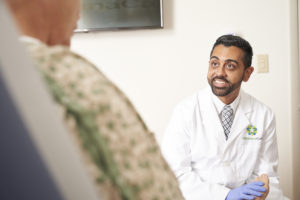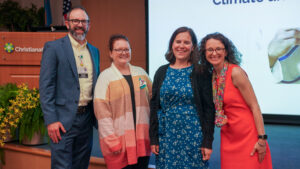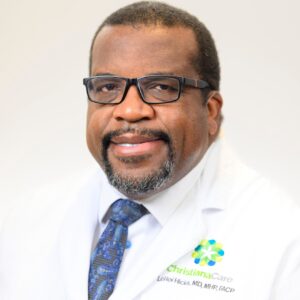
The mythical bird Sankofa teaches us to “always remember the past, for therein lies the future. If forgotten, we are destined to repeat it.”
Christina Watlington, PhD, shared the African proverb during her presentation “Exploring Generational Trauma,” hosted by two of ChristianaCare’s employee resource groups, OneGeneration and GOALS (Growing our African American Leaders Systemwide).
“ChristianaCare is committed to advancing health equity, and an important part of this work is recognizing different communities have different histories,” said Kristen Isaac, MPH, diversity and inclusion specialist at ChristianaCare.
“Generational trauma is an important topic, especially as COVID-19 is disproportionately affecting Black and Brown communities nationwide and many people in these communities are wary of the vaccine.”
Defining trauma as a physically or emotionally harmful event with lasting effects, Watlington explained it can be experienced personally or passed down through generations.
Genocide, slavery, racism, generational poverty, sexual violence and abuse, are all examples of inherited traumas that can impact self-worth and self-efficacy, she said.
Another example, she said, is stolen culture and heritage, when elements of one culture or identity are adopted or “appropriated” by another as treated as their own.
“Trauma doesn’t have to happen to you directly,” Watlington said.
Just hearing the stories of others who have experienced trauma “changes how you see yourself, changes how you see others and changes how you see the world in fundamental areas, such as safety, trust, power, intimacy and control, having a sense of agency, feeling empowered.”
Trauma can have physical as well as emotional implications. Left untreated or unacknowledged — “trauma not transformed is trauma transferred” — trauma may lead to depression, anxiety, low self-esteem, anger and skepticism of people and systems.
Trauma Resources
For immediate assistance 24/7 contact Delaware Mobile Crisis Services.
Center for Grief and Trauma Therapy – Individual and group outpatient psychotherapy.
Child, Inc. – Services related to domestic violence/intimate partner violence; parenting classes, coping with separation seminars; mentoring for children and more.
Children and Families First Delaware – Parenting support, family therapy, adoption, access to resources, and school-based trauma intervention.
Delaware Guidance – Mental health services for children and families.
Supporting KIDDS – Individual and group psychotherapy for children coping with divorce or at loved one’s death.
Survivors of Abuse in Recovery, Inc. (SOAR) – Outpatient individual and group psychotherapy for adult and child survivors of sexual abuse and their families.
There is also evidence it can change our very DNA. Studies in epigenetics — how behavior and environment influence gene expression — show the children of Holocaust survivors and women pregnant during 9/11 were born with stress markers.
“You start to inherit the stuff that doesn’t belong to you,” Watlington said.
Generational mistrust in health care stems from a historic imbalance in treatment of Black and Brown communities, Watlington said in a follow-up conversation about her presentation. Discrimination in health care on the grounds of race has been called “medical apartheid,” notably in the book of the same name by Harriet Washington.
“Medical apartheid is real — we know Black and Brown communities have been targeted by health care in the past,” Watlington said.
A case in point is the infamous Tuskegee Experiment, from 1932 to 1972. Conducted by the U.S. Public Health Service, the “Tuskegee Study of Untreated Syphilis in the Negro Male” offered Black men in Tuskegee, Alabama, incentives to participate in research that researchers knowingly misrepresented to the men.
“Our work as providers is to recognize that peoples’ concerns today have a history,” Watlington added post-event.
“We need to listen and empathize. And we need to educate, amplifying Black and Brown voices who understand the science and can connect with people who are skeptical. We never want to coerce, rather we want to build trust.”
For people experiencing generational trauma, Watlington offered healing strategies:
- Acknowledge the impact of trauma and its affect on your family and life.
- Show compassion toward self and others. Be kind to yourself, as well as tolerant of your own perceived flaws and shortcomings and those of others.
- Practice forgiveness by taking perspective and trying to understand the situational pressures and background factors that makes a person behave the way he or she does.
- Seek professional help from a provider who understands trauma and trauma-informed practices. It may take time to find a therapist who is a good fit for you, but it is a worthwhile investment of your time to have good outcomes in the long run.
The GOALS and OneGeneration ERGs would like caregivers to carry these messages forward, as part of their mission to enhance the caregiver experience, Isaac said.
“We hope caregivers will utilize Watlington’s information in their professional and personal lives. For caregivers interacting with patients on a day-to-day basis, we want them to understand why a patient may be noncompliant or fearful of certain treatments or care plans. It’s knowledge everyone can benefit from.”



